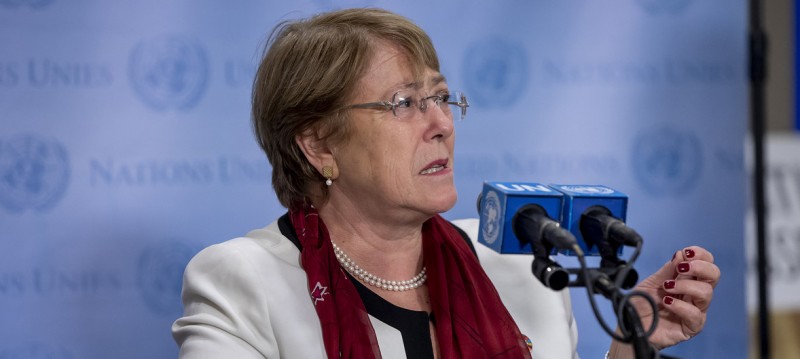Michelle Bachelet, United Nations High Commissioner for Human Rights (photo from 26 September 2018) UN human rights officials have welcomed the “historic” conviction on Thursday by a German court of a former senior Syrian intelligence officer, for crimes against humanity. The man, known as Anwar R, was charged with complicity in the torture of thousands of people between 2011 and 2012 in the Al-Khatib Branch of Syrian General Intelligence in the capital, Damascus.
German court’s historic crimes against humanity finding in #Syria case must spur momentum for international justice. UN Human Rights Chief @mbachelet says it's a clear example of how national courts can and should help bring perpetrators to account.
Read: https://t.co/usnbsulZSj pic.twitter.com/r3HVGYUhmN— UN Human Rights (@UNHumanRights) January 13, 2022
Renewed spotlight on atrocities
UN Human Rights High Commissioner, Michelle Bachelet said his trial cast a much-needed renewed spotlight on the torture and inhuman treatment countless Syrians suffered in detention facilities.
“It is a landmark leap forward in the pursuit of truth, justice and reparations for the serious human rights violations perpetrated in Syria over more than a decade,” she said.
The verdict should also help push forward “all efforts to widen the net of accountability for all perpetrators of the unspeakable crimes that have characterised this brutal conflict,” she added.
Perpetrators now on notice
The Higher Regional Court in the German city of Koblenz sentenced Anwar R, 58, to life in prison for crimes that include torture, killings, serious deprivation of liberty, rape, sexual assault and hostage-taking.
Germany adopted a Code of Crimes against International Law in 2002, which allows courts there to try crimes against international law committed in other countries where neither the perpetrator nor the victim is a German national.
The Code also excludes the statute of limitations for these crimes.
“This conviction has put State authorities on notice – no matter where you are or how senior you may be, if you perpetrate torture or other serious human rights violations, you will be held accountable sooner or later, at home or abroad,” said the UN human rights chief.
Anwar R was a supervisor of Eyad al-Gharib, a Syrian intelligence officer who was convicted by the same court last February for aiding and abetting crimes against humanity. He was sentenced to four-and-a-half years in prison.
“This is a clear example of how national courts can and should fill accountability gaps for such crimes wherever they were committed, through fair and independent investigations and trials carried out in line with international human rights laws and standards,” said Ms. Bachelet. “This serves as a powerful deterrent and helps prevent future atrocities.”
Progress towards justice
The UN Independent International Commission of Inquiry on Syrian also welcomed Thursday’s verdict, though emphasizing the need to achieve justice for victims and survivors.
Three of the Commission’s reports were read into evidence during the trial.
“Verdicts such as today’s represent much-needed progress towards achieving justice for victims and survivors of war crimes in Syria – despite the fact that pathways to accountability remain curtailed in Syria and at the UN Security Council,” said Paulo Sérgio Pinheiro, the Commission’s chair.
Fellow Commissioner Hanny Megally commented that the outcome would not have been possible without the tireless efforts of victims and family associations.
“If Member States want to achieve justice for Syrians, it is the meaningful participation of those Syrian voices that must be supported,” he said.
The UN Human Rights Office, OHCHR, noted that there have been several other criminal and civil cases against former officials and members of non-State armed groups accused of crimes in Germany, Austria, France, Hungary, Sweden, Switzerland, the Netherlands, and other jurisdictions.
A number of proceedings are currently pending in national courts.
OHCHR said action at national levels is particularly important in Syria.
The country is not a party to the Rome Statute, the 1998 treaty that established the International Criminal Court (ICC), which tries cases of war crimes and crimes against humanity, adding “and the UN Security Council has repeatedly failed to refer the situation to the ICC Prosecutor.”




Comments are closed.